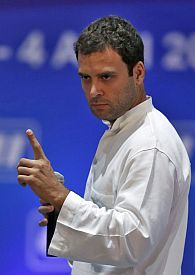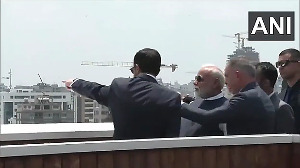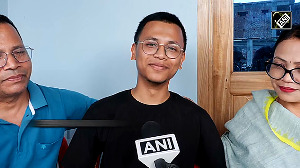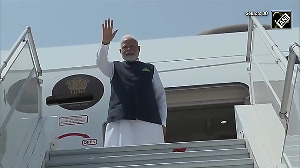 Despite the recent electoral reverses, Rahul is getting ready to walk the fire once more. The question is whether he will get burned or burnished in the process, says Saroj Nagi.
Despite the recent electoral reverses, Rahul is getting ready to walk the fire once more. The question is whether he will get burned or burnished in the process, says Saroj Nagi.
For the Congress, 2013 began with Rahul Gandhi and is ending with him as it desperately tries to extricate itself from the electoral and political quagmire that is dragging it in.
Indeed, in a virtual replay, almost exactly to the date when he was anointed vice president at the Jaipur conclave in January, there will be a repeat show of projecting Rahul as the panacea of the party’s and nation’s problems when the party holds its All Indian Congress Committee session in January 2014 in Delhi and workers call for his declaration as their prime ministerial nominee.
In a way the wheel has turned full circle.
In 2013, his elevation as vice president boosted the sagging morale of the workers who had to bear the brunt of the people’s anger over persisting price rise and allegations of serial corruption including in Commonwealth Games, 2G spectrum allocation and coalgate. The recent electoral debacle in Delhi, Rajasthan, Madhya Pradesh and Chhattisgarh has now sapped them of their energy, reduced their fighting spirit and even made them despair of their future. The faith they placed in Rahul to weave the magic wand lies broken even as he went back on his promise of talking only about the party’s positives or of keeping out tainted candidates during elections.
For Congressmen who have pegged their future to the charisma of the Nehru-Gandhi brand, Rahul is seen to be their best bet yet in the backdrop of his mother and Congress president Sonia Gandhi’s decision to step back because of her advancing age and undisclosed illness and give him a greater role and profile, notwithstanding the debacle in the recent assembly polls where he was the star campaigner.
The only problem is that the best that the Congress has to offer may not be good enough to meet the political and leadership challenges posed by Rahul’s adversaries when the Congress-led United Progressive Alliance coalition at the Centre has lost its sheen, credibility and moral authority with the people.
Rahul’s realisation
Rahul perhaps has also come to realise this -- specially as the party’s humiliating defeat in the four key assembly elections came ahead of the crucial 2014 Lok Sabha polls and in the backdrop of popular anger on the twin issues of relentless price rise and unabated corruption.
In an attempt to limit and possibly even reverse the damage, the Amethi MP is suddenly showing signs of a change in his attitude, behaviour, response, reaction and media outreach as he tries to recast the party’s strategy, tactics, approach and appeal in his desperate search for the elusive winning formula for 2014.
Indeed, ever since the assembly results came out on December 8 and the magnitude of the defeat hit the party, Rahul, the Congress and the UPA have suddenly become overly active. They have performed far more in one month than they have in the five years since the UPA-2 came to power in 2009 during which period the government lurched from one crisis to another, hobbled by policy paralysis, recalcitrant allies and inability to govern effectively and the party and the organisation opted for status quoism that shut out any discussion or debate on burning issues.
Even the party’s much promised chintan shivir in Jaipur was reduced to a slogan shouting jamboree over the elevation of Rahul as vice president.
Sonia promised a deep introspection over the assembly results but urged her workers not to lose heart but gird up for the 2014 Lok Sabha polls by putting up a united front. The government managed to pass the Lokpal bill in Parliament and showed gumption by filing a review petition against re-criminalisation of homosexuality. And the prime minister addressed the despondent Congress MPs where he spelled out the party’s line of defence against charges of corruption, price rise, inflation and policy paralysis.
Rahul, on his part, showed a willingness to re-tune himself and try and surmount his earlier failures to get the party out from the dumps.
Rahul’s reformation: Racing against time
With the Congress out of the reckoning in almost 200 Lok Sabha seats in Bihar, West Bengal, Tamil Nadu and Uttar Pradesh (notwithstanding the flash in the pan victory of 21 seats in 2009), there is no doubt that this has been uppermost on Rahul’s mind. He experimented with several failed avatars in the herculean task of trying to energise the ordinary Congress worker, woo the electorate, rebuild the party’s dwindling social appeal, extend its shrinking geographic reach and try and restore the party to its former glory of being the dominant force and the reference point of politics in the country.
For a young leader who failed to impress or inspire people in general or his supporters in particular over the last few years, witness the responses he crammed in the three weeks since the party’s drubbing in the assembly polls. He vowed to learn from Aam Aadmi Party’s stupendous success and do things in unimaginable ways, stepped out to urge opponents to reconsider their stand and help pass the Lokpal bill, spoke on the anti-corruption legislation in the Lok Sabha, talked of putting together a framework to weed out corruption, identified himself with those who were upset with the Supreme Court ruling on Section 377 which re-criminalises homosexuality, sought to blend his pro-poor stance with a pro-corporate outlook while addressing the Federation of Indian Chambers of Commerce and Industry, began a series of informal and off the record interactions with the media, visited the riot relief camps at Muzaffarnagar and Shamli in Uttar Pradesh, held a meeting with Congress chief ministers to prepare an action plan for curbing inflation and speedy rollout of right to food programme and trashed the Maharashtra cabinet’s decision to reject the judicial commission’s report on the Adarsh housing scam, forcing the state government to reconsider their stand.
His denunciation of the state government’s move was reminiscent of his strong opposition to the Union Cabinet’s decision to bring an ordinance to shield convicted lawmakers. But Rahul had learned the hard way that it is not polite to say that the ordinance was ‘nonsense’ and should be torn and consigned to the dust bin.
In trying to make up for his failure to identify himself with the youngsters and the middle-class who had come out in support of Anna Hazare’s anti-corruption movement and thronged the streets to express their anger and anguish over the brutal gangrape of a young paramedic, his statement denouncing the ordinance in the manner he did stripped Prime Minister Manmohan Singh and his cabinet of whatever little authority they had and even put a question mark over the clearance given to it by the core committee of which Sonia is a part.
This time, he was careful in his choice of words but firm in slamming the state government’s decision which threatened to deepen the impression of the Congress shielding and perpetuating corruption. “If you are asking me what I think about that… I don’t myself agree with that decision. They should reconsider that decision. That’s my personal opinion… There’s no question of protecting anybody,” he said on his fourth appearance before the national media since the state poll debacle.
The signal that emanated was of Rahul playing the vigilante, if not opposition, to his own party and government, be it the central or state level, and distancing his persona from the allegations hurled at some of his own leaders.
Yet another instance of his attempt to reform and rework his approach was visible at the FICCI annual meeting where he tried to woo the corporate world which has been openly backing Bharatiya Janata Party prime ministerial candidate Narendra Modi. He dispensed with the theatrics and the homilies that had defined his speech to the Confederation of Indian Industries in April. Instead, he tried to speak their language by talking about labour reforms, boosting manufacture for inclusive growth and job creation and early environmental clearances to projects that do not damage the environment and where any such damage is reversible.
Jayanthi Natarajan’s resignation as environment minister even as he was trying to address the industry’s concerns was a pointer of the kind of changes to come notwithstanding clarifications that she was being drafted for party work.
Rahul is now getting ready to make major organisational changes to give a new life and new look to the Congress. The coming days could witness a generational shift in states where younger leaders would be entrusted with the task of reviving the party, rebuilding the organisation and revitalising and reinvigorating the electoral machinery while reaching out to the large mass of youth who have become disillusioned with him and the Congress.
Ready for the long haul?
The sudden spurt of activity has inevitably raised the question whether Rahul is being proactive only because the Lok Sabha elections are coming up or whether he is there for a long and sustained haul.
More importantly, it also raises the question whether or not it is perhaps a little too late in the day for him to repair the damage he had caused to himself and his party with his failure to seize the moment and of his being rarely available, audible or visible, when his presence would have mattered to his party and supporters and the people at large. His long silences and equally long and sudden disappearances from the scene contrasted sharply with that of his adversaries who believe in remaining in the people’s eye and memory.
Unlike his ancestors like great grandfather Jawaharlal Nehru, grandmother Indira Gandhi or father Rajiv Gandhi, Rahul does not appear to possess the charisma that establishes an immediate rapport with the people. He still has a lot of ground to cover in dealing with his rivals like Modi, Aam Aadmi Party’s Arvind Kejriwal or for that matter regional chieftains/chief ministers like Janata Dal-United’s Nitish Kumar in Bihar, Biju Janata Dal’s Naveen Patnaik in Odisha, Trinamool Congress’s Mamata Banerjee in West Bengal, Bahujan Samaj Party’s Mayawati or Samajwadi Party’s Mulayam Singh Yadav in Uttar Pradesh and AIADMK’s J Jayalalithaa -- all of whom are also potential claimants for the prime minister’s post depending on the number of seats each of them gets in the Lok Sabha elections.
Unlike his adversaries who have a track record in government or administration to flaunt, Rahul has little to show by way of performance, having rejected all offers from the prime minister to join his cabinet -- an invite that would have given him ample opportunities to come to grips with governance. Instead, he opted to stay out, choosing instead to focus on rebuilding the organisation.
Unlike Sonia’s decision to renounce the prime minister’s post -- which added to her stature and dwarfed her rivals -- Rahul’s reluctance to stay out of power was lambasted by critics as an attempt to shirk responsibility, especially when his proclaimed effort to democratise and broadbase the Youth Congress remains an unfinished and in some cases even a controversial task.
He is now being called upon to lead from the front, with Sonia expected to play the role of an elder statesperson.
And for that he will need to draw inspiration from his grandmother Indira Gandhi who stormed back to power in 1980 or closer home to his mother Sonia who overcame all political and personal odds, including the campaign against her foreign origin, and showed the determination and flexibility to shed the party’s ‘go it alone’ policy, stitch up alliances and set up the Congress’s first coalition government at the Centre. She topped it by renouncing the prime minister’s post in 2004 when she installed Singh in South Bloc and steered the UPA to its second victory in 2009.
Despite the recent electoral reverses, Rahul is getting ready to walk the fire once more. The question is whether he will get burned or burnished in the process.
Saroj Nagi is a senior journalist based in New Delhi.











